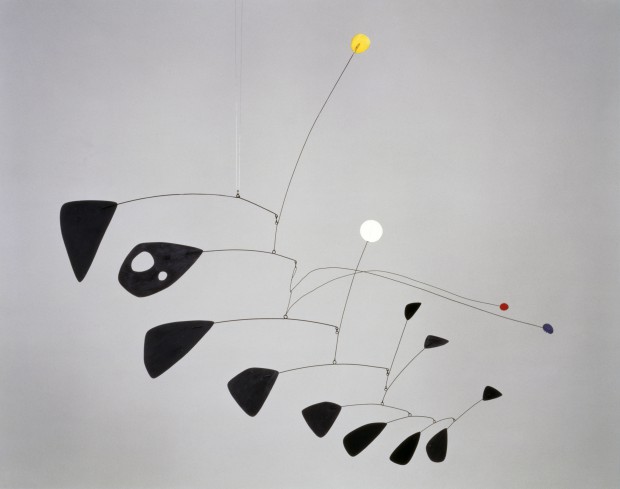One day, in October 1930, Alexander Calder visited the great abstract painter Piet Mondrian in his apartment in Paris. The Dutch artist had turned this small space on rue du Départ, which also doubled as his studio, into a walk-in work of art. Even his gramophone, painted bright red, had become a note of pure form and colour.
Calder was impressed by the squares and oblongs of the pictures all around. But he also asked a question: wouldn’t it be fun to make these rectangles move? With a perfectly straight face Mondrian replied that this wasn’t necessary: ‘My paintings are already very fast.’
As I walked around Performing Sculpture, the new Calder exhibition at Tate Modern, I mused on which of them had got the better of this exchange. In a free-association test, any art buff prompted with the word ‘Calder’ would immediately respond ‘mobile’. This is because his distinctive contribution to modernism was to make abstract sculpture move.
Naturally, the galleries at Tate Modern are full of Calder’s mobiles: suspended from the ceiling, rising on filigree arrangements like inverted coathangers from the floor. Quite often, if not quite always, they are indeed in motion, gently revolving on currents of air from vents in the floor or the mild jetstream caused by critics walking past, notebooks in hands. It does not take much to make the mobiles stir, but visitors are strictly warned against doing so by touching them — or even blowing in their direction.
Worries about conservation have immobilised quite a few of the pieces in this exhibition. There are early sculptures equipped with home-made-looking mechanisms or hand-operated handles. Sadly, these amusing toys have grown too fragile, valuable and art-historically important to flap or wave as their creator intended.
Others have been silenced. Intriguingly, Calder considered that sound was an important aspect of sculpture. He collaborated with composers and choreographers. Some of his works were intended to chime or collide randomly with objects. Again, however, these have become too precious to make a noise.
Calder’s aerial sculptures are unquestionably beautiful: delicately balanced arrangements of forms like fluttering leaves, subatomic particles or celestial bodies, suspended from the lightest possible cat’s cradle of wire. This is the opposite of the orthodox conception of sculpture from Michelangelo to Richard Serra: an art that is all about mass, weight and three-dimensional form. A typical Calder mobile seems to have almost no volume — its shapes are made from thin sheets of painted metal — and the whole point is about defying weight. This is the closest thing there is to flying sculpture; indeed one exhibit, entitled ‘Blériot’ (1949), resembles an early aeroplane.
You could get mildly hypnotised watching a mobile orbiting, some parts at a slower rate than others; but to my mind there is something missing. It doesn’t much matter that, the question of mobility apart, Calder was highly derivative. Everybody has influences, and his are easy to spot: not much from Mondrian, but an awful lot of Miró and a touch of the Swiss painter/sculptor Jean Arp. There’s a whole room of Calders that are in effect moving pictures in 3D — coloured rectangles with curving rods and cut-out silhouettes like amoebas, eggs and stars dangling in front of them like puppets in a toy theatre.
Wit and playfulness are the strengths — and perhaps the weaknesses — of Calder’s work from the start. Before that fateful visit chez Mondrian, which sent him down an abstract path, Calder was a figurative artist. His early work revolved around a miniature circus, the Cirque Calder, of which he gave performances in his studio from time to time. For this he made acrobats and animals fashioned out of wire: it was an engaging and slightly naughty (the human performers are naked) form of drawing in space. The line was borrowed from Picasso, but the effect is individual and charming. Indeed, this is the most enjoyable room because the work here is less repetitive.
The trouble with the mobiles — for me — is that though individually they are delightful, they are all rather similar. None is really memorable, which might be because their shapes constantly shift. That is one of the paradoxes of art: still images can contain an immense amount of drama and action too. They do so, furthermore, in a way that sticks in your mind. So Mondrian got it right: his paintings were much better as they were, motionless. But possibly Calder’s sculptures are actually more entertaining.








Comments